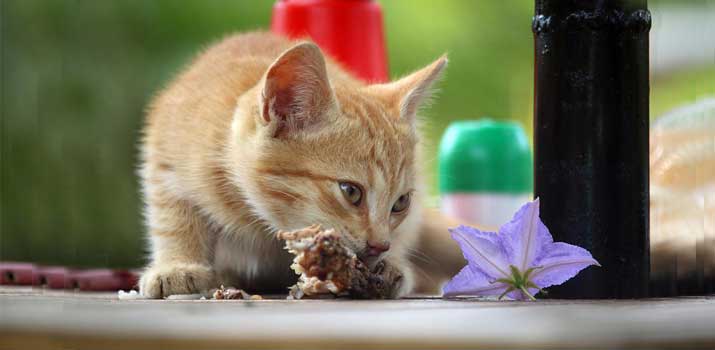We all know that breakfast is the most important meal of the day! Whether you’re someone who indulges in a feast to start the day or you prefer to keep things light, what you eat after waking up can have a considerable impact on your day moving forward.
Your cat’s the same way!

They appreciate a hearty meal just as much as humans do. Domesticated cats are spoiled rotten as far as their eating habits go.
Wild felines don’t always know when they can find prey and satiate their needs. As a result, their eating schedule tends to be more sporadic and challenging to plan out.
Fortunately, that’s not the case with your feline friend living in the lap of luxury.
Your kitty expects nothing but the best to start their day of lounging around on the right food. But what do cats like to eat for breakfast anyway?
Understanding Feline Sleeping Habits
Before we go on to what you should feed your cat, let’s talk about why they need these meals at all!
It’s a common misconception that cats don’t require meals in the morning.
We see cat owners making that mistake all the time! Instead of providing multiple meals, they free-feed or offer a single large meal at the end of the day.
The confusion often comes from a cat’s behavior.
Most felines spend their days sleeping and basking in the sunlight. As the sun goes down, they spring into action and start exploring. Usually, it’s around dusk that feral cats go on the hunt.
Because most people don’t see cats being active until the end of the day, they assume felines are nocturnal. However, that’s not the case. Cats are neither nocturnal nor diurnal. They’re crepuscular!
A crepuscular animal is most active during dawn and dusk hours. It’s a far cry from the diurnal lifestyle of humans or the entirely nocturnal habits of a raccoon.
Cats are somewhere in the middle, spending most of the day relaxing and sleeping. Those few hours of dawn and dusk are all cats have to be lively!
How That Affects Eating Schedules
Cats often spend 12 to 16 hours sleeping every day. That might seem like overkill to us, but those long hours are necessary for felines to stay healthy.
Despite the inactivity, cats still need to eat to fulfill their dietary needs and restore their energy supplies.
Based on their odd sleeping patterns, you can probably guess that cats need to eat at least twice a day. Typically, they prefer to feed every 12 hours or so.
Coincidentally, that aligns pretty well with human eat patterns. With some steady routine, you can dole out your cat’s meals at the same time you enjoy yours.
Provide a meal during dinner time and one for breakfast. Your cat will thank you for it!
Younger cats will need to eat a little more frequently.
Growing kittens tend to sleep even more than their adult counterparts. However, they require three meals a day. Once again, you can line up your cat’s meals with your own.
Just add an extra feeding time around lunch!
As your cat passes six months of age, you can slowly transition to a morning and evening meal.
It is possible to skip breakfast time for your cat, as domesticated felines are pretty flexible with scheduling. They adapt well to whatever their owner does. However, we don’t recommend forgoing breakfast if you can avoid it.
Related: Best Automatic Wet Cat Food Feeders
Doing so will push extend the time between meals, pushing your cat dangerously close to the 12-hour mark. Cats that don’t eat for around 12 hours will experience increased acidity in their gut.
Not only is it super uncomfortable and nauseating for your cat, but the acids could end up causing some health complications down the line.
Always feed your cat breakfast. They deserve to start the day off feeling full and satiated.
What Should Cats Eat for Breakfast?
Now that you know how important the first meal of the day is for your feline friend, what kind of breakfast should you prepare?
You don’t have to get super creative or opulent here. The best food for your cat in the morning is traditional cat food! They need to consume nutritionally dense meals that fulfill all of their dietary needs.
For an adult cat, that means the food should have no less than 26 percent protein and 9 percent fat.
Cats are obligate carnivores, which means that they must consume a protein-rich diet to survive. They can eat plant-based foods like fruits and vegetables, but protein should always be the star of the show.
Felines don’t eat a ton of food when it comes to volume. For this reason, nutritional density is a must!
Every morsel of food should be chock-full of vitamins, minerals, and calories. Otherwise, your kitty will have to eat a lot of food and put themselves at risk for obesity to fulfill their dietary needs.
There’s not a shortage of great commercial cat food products out there. They do just fine as long as you choose a high-quality formula.
Pay attention to the ingredient list and choose one that’s nutritionally dense and supportive of your cat’s overall health.
Whether it’s wet canned food or dry kibble, always scrutinize the ingredients list to ensure that your cat is getting the best.
Can Cats Eat Human Food for Breakfast?
If you’re like most cat lovers, you find it hard to resist those loving stares!
Cats are notorious for getting into all kinds of trouble involving human food. They might as well be as bad as dogs when it comes to begging and sneaking!
So, can they indulge in human food?
The good news is that you can provide human food every once in a while. The bad news is that you have to be extra careful about what you offer and how much you give.
Human foods are no replacement for traditional cat food.
It’s true that cats are natural carnivores that thrive on meat. But that doesn’t mean that your plate of bacon is a suitable long-term breakfast solution for your cat!
Occasional snacks here and there aren’t an issue. However, it shouldn’t become a regular thing.
Cats that eat more human food than cat food are prone to obesity, diabetes, and a host of other health complications. Look at your food and table scraps as a snack.
Your cat can enjoy it periodically, but it should never replace cat food entirely.
Homemade Cat Meals
If you’re feeling extra generous, you can substitute a full breakfast meal of cat food for a homemade alternative.
There are plenty of foods that cats will enjoy. Creating a meal from scratch is a great way to spoil your feline friend while still controlling what they consume.
The most critical thing to remember is that you must keep things simple. Be mindful of the fat and salt content. Also, avoid spices and unnecessary extras.
Cats are pretty easy to please when you make meals from scratch. They don’t need all of the flavor additives to enjoy.
Here are several ingredients you can combine to create the perfect homemade breakfast for your cat.
- Non-salted cooked bacon
- Plain baked bread
- Plain eggs
- Cottage cheese
- Whole oats
- Cooked rice
- Chicken meat
- Steamed fish
- Season-free vegetables
- Seedless fruits
- Nut-based, lactose-free milk
Foods to Avoid
Be careful about what you feed your cat. While cats can eat meat and eggs, you should avoid anything that could cause stomach upsets, allergic reactions, and other potential problems.
Whatever you do, avoid giving your cat caffeine or milk.
Caffeine from coffee can lead to hyperactivity. Even a few sips can be fatal, causing seizures, dramatically elevated blood pressure, and more.
Milk is a big or a toss-up. Some cats can handle traditional cow’s milk without any issues. However, many felines are lactose intolerant.
Cow’s milk contains lactose sugar, which causes all kinds of digestive problems. If you want to provide your cat with milk to lap up, stick with nut-based milk. Almond milk, for example, is a fantastic substitute.
Other foods you should avoid include:
- Chocolate
- Seeds
- Raw meat
- Onions
- Garlic
- Raisins or grapes
- High-gluten items
- Raw dough
- Artificial sweeteners
If you’re unsure about whether a food is safe or not, don’t give it to your cat. It’s better to be overly cautious than risk potential health problems for your cat.
As mentioned earlier, human food can’t replace traditional cat food. Always make your cat’s regular kibble or canned food the star of the show and save home meals for special occasions only.
How Much Food Should a Cat Eat for Breakfast?
How much to feed your cat depends on many factors. Their age, weight, and body condition all come into play.
Generally, you’ll have to adjust meal sizes as your cat transitions from a kitten to an adult. Even then, you might need to make adjustments based on activity and body tone.
As a general rule of thumb, adult cats can eat around 250 grams of food per meal. That’s equivalent to a little more than a cup.
If you’re still unsure, talk to your vet for some guidance.
Conclusion
To sum up, cats need a nutrient-rich meal to start their days off strong! They can eat a wide variety of foods, but traditional commercial cat food products are the best way to go.
Every once in a while, you can treat your cat to an indulgent meal you make from scratch. Make an event out of it! Your feline friend will thank you for it and gobble up anything you put in front of them!
Also Read: Why Does My Cat Smell Like Poop: 6 Causes

